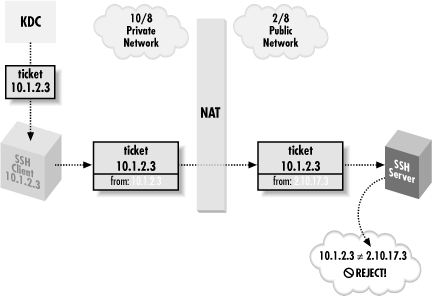
Published on 21 Aug 2006 · Filed in Tutorial · 548 words (estimated 3 minutes to read)
Kerberos authentication in SSH is a very useful capability that closes a well-known, albeit accepted, weakness in the protocol. It has the added advantage of enabling a single sign-on capability with respect to SSH connections on Windows platforms, because the underlying Windows authentication model is Kerberos. Jun 21, 2017 Connection SSH Kerberos checked the Create forwardable tickets and enable “Attempt Kerberos auth (SSH-2)” 10. Tried nested SSO and go back to the first hop and run klist -f to confirm the host ticket has the ' O ' flag as follows.
First, a quick disclaimer: I have only tested this in a very limited configuration. Namely, using OpenSSH 4.2p1 on Mac OS X (as reported by ssh -V) to connect to OpenSSH 3.9p1 on CentOS 4.3 (again, as reported by ssh -V). I have been trying to get it to work with the SSH server in Solaris 10 but have been unsuccessful thus far (more on that in a moment).
How Kerberos Works
Configuring the SSH Server
First off, you’ll need to make sure that the OpenSSH server’s Kerberos configuration (in /etc/krb5.conf) is correct and works, and that the server’s keytab (typically /etc/krb5.keytab) contains an entry for “host/fqdn@REALM” (case-sensitive). I won’t go into details on how this is done again; instead, I’ll refer you to any one of the recent Kerberos-related articles (like this one, this one, or even this one). Just be sure that you can issue a kinit -k host/fqdn@REALM and get back a Kerberos ticket without having specify a password. (This tells you that the keytab is working as expected.)
Next, configure the /etc/ssh/sshd_config file (the system-wide SSH daemon configuration file) to include the following lines (note that these lines may already be present, just commented out; other lines may be present, but with different values):

After these changes are made, you’ll need to restart the SSH daemon.

Configuring the SSH Client
Because the OpenSSH client configuration does not include GSSAPI authentication by default, you’ll most likely need to modify your SSH client configuration. Edit the global client-side configuration file; on Mac OS X it’s found as /etc/ssh_config. Change it to include the following lines:
This limits GSSAPI authentication to only those hosts in the example.com domain. Modify the domain to be the appropriate domain for your network.
Testing the Configuration
Obtain a valid Kerberos ticket from Active Directory. On Mac OS X, you can use the excellent Kerberos.app that’s bundled with the system to obtain a ticket. You can also just use kinit username from the command line.
Once you have a ticket, you should be able to simply ssh fqdn.of.server and you will get logged in, without getting prompted for a password. If you get prompted for a password, go back and double-check your keytab, your SSH daemon configuration, and the time configuration on your OpenSSH server. Because Kerberos requires time synchronization, differences of greater than 5 minutes will cause the authentication to fail.
Future Configurations
As I mentioned earlier, I have also been trying to make this work with the SSH server bundled with Solaris 10 (which, as I understand it, is not OpenSSH). So far, I have been unsuccessful in this effort, even though the pam_krb5 integration (having the keyboard-interactive login checked/authenticated via Kerberos) is working just fine. Sun’s SSH server is supposed to include GSSAPI authentication enabled by default, but for some reason my client is throwing a “Server not found in Kerberos database” error (seen when running ssh -vvv full.server.name). I’m not yet sure what’s going on there, but I intend to continue to research the problem and try to find a solution. Solaris gurus out there, I’m open for suggestions.
Ssh Kerberos Authentication
UPDATE: The problems with Kerberos SSH logins to Solaris was a client-side issue; read more about that here.
Metadata and Navigation
Be social and share this post!
Ssh Kerberos Log
Related Posts
Ssh Kerberos International
- More on Kerberos Authentication Against Active Directory21 Aug 2006
- Solaris 10 and Active Directory Integration15 Aug 2006
- A Couple Cool Mac Discoveries11 Aug 2006
